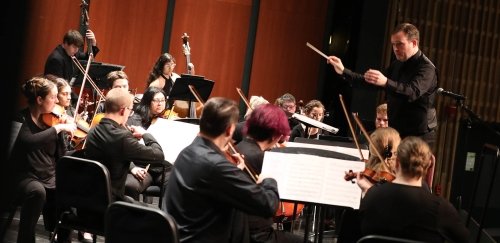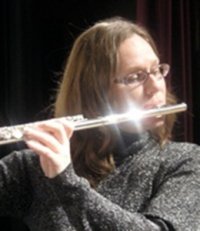
Music (B.A.)
We're not just built for classroom learning, we're also built for personal growth.
- Program Contact
-
Professor and Chairperson of Music, Theatre and Dance
-
Administrative Assistant
We offer a distinctive curriculum that focuses on providing aspiring musicians with the tools to advance their musicality through creative opportunities. Connecting that content to real-world scenarios, while serving as a community source for cultural and educational events. Encouraged by its excellent faculty, students are given ample opportunities in their chosen field of study for growth and development. Central to its faculty philosophy is mentoring and guiding students to professional success as they continue to their post-university life.
Curriculum is listed below.
Current student information, interest forms, audition details, ensembles and alumni info is located on the Music Department web page.
Courses and Curriculum
All tracks require an audition for acceptance into our music program.
- B.M. Music with Elective Studies in Business
- Liberal Arts
- Music Education (Instrumental)
- Music Education (Vocal)
- Music Performance (Instrumental)
- Music Performance (Vocal)
- Music Technology
*Please see the CU degree requirements effective Fall 2023. All enrolled students can also review their degree program requirements and track progress to degree completion in Degree Works.
Accredited with the Pennsylvania Department of Education, the Music Education Certification K-12 program develops musical skills through courses in music theory, music history, applied study, and performing ensembles. This track provides ample opportunity for you to participate in experiential studies through observations and teaching in local schools throughout their studies. The degree leads to Pennsylvania public school certification.
Changing Requirements
The State Board of Education adopted changes that affect all of Pennsylvania's instructional and educational specialist programs by adding 9 credits or 270 hours or equivalent combination for adaptations and accommodations for diverse students in an inclusive setting and three credits or 90 hours or equivalent combination to meet the instructional needs of English Language Learners. Although these regulatory changes became effective on September 22, 2007, the PA Department of Education has not yet developed final requirements for colleges/universities to follow. Therefore, additional program requirements will be developed and incorporated into your certification program to comply with new regulations for certifying teachers that become effective on January 1, 2013.
As per PRP3604: All students earning a first baccalaureate degree will take at least 30 of their last 45 credits at Bloomsburg University, no more credits are required than the 30 credits. All first baccalaureate students will take at least 50% of credits required for the Major from a PASSHE university. Bloomsburg University may require up to a maximum of 50% of the Major credits. Program exceptions to the policy are to be approved by the Office of the Chancellor.
In addition to 40 credits of general education requirements and the 42 credits of requirements of the major, students are required to take 47 credits of professional teacher courses to complete the 129-credit requirement for a Bachelor of Arts degree.
Students with a concentration in Music Education Certification K-12 will:
- Comprehend the principles of music theory and display aural acuity.
- Understand the historical period contribution to music in both cultural and artistic context.
- Participate in ensembles.
- Meet the performance requirements of applied study.
- Apply voice, strings, brass, percussion and woodwinds pedagogical methodologies.
- Display functional keyboard skills.
- Develop a music curriculum including strategies for diverse learners.
- Conduct choral and/or instrumental ensembles.
- Present a recital.
- Use music technology.
- Compose and critique.
- Write daily lesson plans and thematic units in preparation for the teaching profession.
Assessment Criteria and Procedures:
The culmination of the Music Education Certification, K-12 track is one semester of student teaching experience. Because the certification is K-12, the student teaching experience will include both elementary and secondary assignments. The student will be evaluated by the cooperating teacher and the university supervisor.
Music majors are required to complete a checklist each semester with their advisor and keep it in their file. At graduation the advisor will sign that it is completed and forward it to the chair for signature. The student will give the chair the "Application for Graduation" by February 1 for May graduation, by March 1 for summer graduation and by October 1 for December graduation. The advisor and the student need to complete this before those dates.
All music majors are required to keep a portfolio and have it checked each semester by their advisor. All music majors have a recital attendance requirement and a sophomore and senior exam. Information is found in the music major policy packet.
(All Music courses must have a grade of C or better, C- does not count)
Music Theory
MUSIC.250 Diatonic Harmony
MUSIC.249 Aural Skills 1 (taken concurrently w/MUSIC.250)
MUSIC.260 Chromatic Harmony
MUSIC.259 Aural Skills 2 (taken concurrently w/MUSIC.260)
MUSIC.380 Advanced Harmony
MUSIC.379 Aural Skills 3 (taken concurrently w/MUSIC.380)
MUSIC.390 Modern Harmony
MUSIC.411 Orchestration
Music History
MUSIC.105 Music Literature
MUSIC.321 Music History - to 1750
MUSIC.322 Music History 1750 to present
MUSIC.102 World Music
Applied Instruction
Seven semesters (ten credits) of applied instruction on the same instrument. Before student teaching, during the seventh semester of applied study, in the senior year, Music Education majors must perform a half hour recital on the same instrument chosen for seven semesters of applied instruction.
Ensembles
Ten ensembles (five credits). Must be in at least one ensemble course each semester for 7 semesters prior to student teaching.
Piano Proficiency Courses (Must pass piano proficiency exam)
MUSIC.302 Keyboard Skills II
Other Music Courses
MUSIC.231 General Conducting
MUSIC.328 Choral Conducting and Methods
OR
MUSIC.329 Instr Conducting & Methods
Recital Attendance
MUSIC.100 Seven semesters, Pass/Fail (zero credits)
Professional Teacher Education Courses (47 credits) – All courses must have a grade of C or better, C- does not count
MUSIC.118 Intro to Music Education
MUSIC.229 Music Ed Computing & Tech
MUSIC.305 Special Topics in Music Ed
MUSIC.305 Special Topics in Music Ed
MUSIC.331 Elementary Methods & Curr
MUSIC.319 Secondary Methods and Curr
PSYCH.211 Early Child Development OR PSYCH.212 Adolescent Development
MUSIC.495 Student Teaching I*
MUSIC.496 Student Teaching 2*
EDFOUND.311 Educ Measurements & Eval
SPECED.358 Meth of Instr for individ w/Disab
SPECED.275 Link Assess & Instr for Stud w/Disab
AUDSLP.415 English Lang Learn:Basic Lang&Comm OR AUDSLP.432 Comm/Ed ELLs
EDFOUND.406 Multicultural Education
MUSIC.203 Voice Methods
MUSIC.206 String Methods I
MUSIC.220 String Methods II
MUSIC.207 Brass Methods I
MUSIC.208 Brass Methods II
MUSIC.209 Percussion Methods
MUSIC.232 Woodwind Methods I
MUSIC.233 Woodwind Methods II
*One semester of 16 weeks, (12 credits), 7.5 hours daily, incorporating experience/instruction in vocal or instrumental settings, including elementary, middle, and secondary experience with the majority scheduled in the specialty track.
General Education Requirements (MusEd)
(Any courses marked with * must have a grade of C or better, C- doesn't count)
1. Communication 7 GEPs (3 disciplines)
ENGLISH.101 Foundations of College Writing*
MUSIC.321 Music History 1 *
COMMSTUD.103 Public Speaking*
2. Information Literacy 2 GEPs (1 discipline)
MUSIC.229 Music Education Comp and Technology
3. Analytical and Quantitative Skills 5 GEPs (2 disciplines)
MATH.___ Math Thinking 101 * or
Finite Math 111* or
Algebra 118* Applied Matrix or
Essentials of Calculus 123*
PSYCH.160 Applied Statistics for Behavioral Sciences*
4. Cultures and Diversity 5 GEPs (2 disciplines)
MUSIC.102 World Music*
SPECED.101 Intro to Exceptional Individual*
(Counted in Goal 10)
5. Natural Sciences 5 GEPs (2 disciplines)
6. Social Sciences 5 GEPs (2 disciplines)
PSYCH.101 General Psychology*
SOC.211 Principles of Sociology*
7. Arts and Humanities 5 GEPs (2 Disciplines)
MUSIC.105 Music Literature*
ENGLISH.__ Choice of British (246, 247)*
or American Literature (236, 237)*
8. Second Language 2 GEPs (one discipline)
Testing out is possible
9. Healthy Living 2 GEPs (one discipline)
10. Citizenship 2 GEPs (one discipline)
SPECED.101 Intro to Exceptional Individual*
Total GenEd Credits: May differ depending on student choices, minimum 40 credits. Must have the number of GEPs for each of 10 goals. Combined total of credits in gen. ed. must equal 40 to make 129 credits.
Total Minimum required Credits for graduation: 129
Our audio-video recording program is designed for musicians with a career interest in the technical aspects of studio sound recording or sound reinforcement in either "live" applications or in recording studio. This track provides sound equipment for hands-on use, and internship experiences in the field. Our modern audio recording studio is updated on a regular basis to provide real-world applications and equipment.
As per PRP3604: All students earning a first baccalaureate degree will take at least 30 of their last 45 credits at Bloomsburg University, no more credits are required than the 30 credits. All first baccalaureate students will take at least 50% of credits required for the Major from a PASSHE university. Bloomsburg University may require up to a maximum of 50% of the Major credits. Program exceptions to the policy are to be approved by the Office of the Chancellor.
In addition to 40 credits of general education requirements, the 43 credits of requirements of the major, and 20 credits of recording specialization courses, students choose electives to complete the 120-credit requirement for a Bachelor of Arts degree.
Assessment Criteria and Procedures: Students will submit a cumulative portfolio, which will exhibit the breadth and depth of their experiences throughout their studies at the university. Summary of the required internships and a log of the work required for the audio-video recording concentration are to be included. The faculty member supervising the internship experience will review the portfolio to determine that the student has a sufficient variety and content to be both current and successful in the workplace.
Music majors are required to complete a checklist each semester with their advisor and keep it in their file. At graduation the advisors will sign that it is completed and forward it to the chair for signature. The student will give the chair the "Application for Graduation" by February 1 for May graduation, by March 1 for summer graduation and by October 1 for December graduation. The advisor and the student need to complete this before those dates.
All music majors are required to keep a portfolio and have it checked each semester by their advisor. All music majors have a recital attendance requirement and a sophomore and senior exam. Information is found in the music major policy packet
(All music courses must have a grade of C or better, C- does not count)
Music Theory
MUSIC.250 Diatonic Harmony
MUSIC.249 Aural Skills 1 (taken concurrently w/MUSIC.250)
MUSIC.260 Chromatic Harmony
MUSIC.259 Aural Skills 2 (taken concurrently w/MUSIC.260)
MUSIC.380 Advanced Harmony
MUSIC.379 Aural Skills 3 (taken concurrently w/MUSIC.380)
MUSIC.390 Modern Harmony
MUSIC.411 Orchestration
Music History
MUSIC.105 Music Literature
MUSIC.321 Music History - to 1750
MUSIC.322 Music History 1750 to present
MUSIC.102 World Music
Applied Instruction
Eight semesters (eight credits) of applied instruction on the same instrument.
Ensembles
Eight semesters (Eight credits). Must be in at least one ensemble course each semester for 8 semesters.
Methods Courses
MUSIC.231 General Conducting
Piano Proficiency (May need Class Piano 1)
MUSIC.205 Class Piano 2
MUSIC.212 Class Piano 3
Recording Specialization Courses (courses must have a grade of C or better, C- does not count)
MUSIC.219 Basic Audio Recording
MUSIC.332 Audio Recording II
MUSIC.424 Audio Recording III
MUSIC.425 Audio Recording IV
MUSIC.426 Audio Recording V
MUSIC.427 Special Topics in Audio Recording
MUSIC.333 Audio Lab
MUSIC.333 Audio Lab
MUSIC.497 Internship in Music
Recital Attendance
MUSIC.100 Eight semesters, Pass/Fail (zero credits)
Electives (If needed)
General Education Requirements (Audio Recording)
(Any courses marked with * must have a grade of C or better, C- doesn't count)
1. Communication 7 GEPs (3 disciplines)
ENGLISH.101 Foundations of College Writing
MUSIC.321 Music History 1 *
2. Information Literacy 2 GEPs (1 discipline)
3. Analytical and Quantitative Skills 5 GEPs (2 disciplines)
4. Cultures and Diversity 5 GEPs (2 disciplines)
MUSIC.102 World Music*
5. Natural Sciences 5 GEPs (2 disciplines)
6. Social Sciences 5 GEPs (2 disciplines)
7. Arts and Humanities 5 GEPs (2 Disciplines)
MUSIC.105 Music Literature*
8. Second Language 2 GEPs (one discipline)
Testing out is possible
9. Healthy Living 2 GEPs (one discipline)
10. Citizenship 2 GEPs (one discipline)
Total GenEd Credits: May differ depending on student choices, minimum 40 credits. Must have the number of GEPs for each of 10 goals. Combined total of credits in general education and electives must equal 57 to make 120 credits.
Total Minimum required Credits for graduation: 120
Is it musical performance, theory, composition or history that excites you? Designed as a general music track to suit a multitude of career interests, the Liberal Arts program is tailored to suit your needs. Music facilities for all include faculty studios, classrooms, music libraries, a new innovative music lab using a computer/keyboard/software combination for music theory composition, and two performance venues.
As per PRP3604: All students earning a first baccalaureate degree will take at least 30 of their last 45 credits at Bloomsburg University, no more credits are required than the 30 credits. All first baccalaureate students will take at least 50% of credits required for the Major from a PASSHE university. Bloomsburg University may require up to a maximum of 50% of the Major credits. Program exceptions to the policy are to be approved by the Office of the Chancellor.
In addition to 40 credits of general education requirements and 42 credits of requirements of the major, sufficient elective courses are selected by the student to reach the university's 120-credit requirement for a Bachelor of Arts degree.
Assessment Criteria and Procedures
Students will submit a capstone project that will exhibit the breadth and depth of their experiences throughout their studies at the university. The capstone activity will be a project designed by the student, and submitted to the faculty advisor and all faculty for approval. The capstone experience should follow the procedures outlined by the music department. Depending on the career interest of the student, it could be a recital, research paper, compositional project, or other research venture. The faculty member supervising the applied lesson (faculty advisor) will review the project to determine that the student has a project of sufficient depth of experience to be considered.
Music majors are required to complete a checklist each semester with their advisor and keep it in their file. At graduation the advisors will sign that it is completed and forward it to the chair for signature. The student will give the chair the "Application for Graduation" by February 1 for May graduation, by March 1 for summer graduation and by October 1 for December graduation. The advisor and the student need to complete this before those dates.
All music majors are required to keep a portfolio and have it checked each semester by their advisor. All music majors have a recital attendance requirement and a sophomore and senior exam. Information is found in the music major policy packet.
(All music courses must have a grade of C or better, C- does not count)
Music Theory
MUSIC.250 Diatonic Harmony
MUSIC.249 Aural Skills 1 (taken concurrently w/MUSIC.250)
MUSIC.260 Chromatic Harmony
MUSIC.259 Aural Skills 2 (taken concurrently w/MUSIC.260)
MUSIC.380 Advanced Harmony
MUSIC.379 Aural Skills 3 (taken concurrently w/MUSIC.380)
MUSIC.390 Modern Harmony
MUSIC.411 Orchestration
Music History
MUSIC.105 Music Literature
MUSIC.321 Music History - to 1750
MUSIC.322 Music History - 1750 to present
MUSIC.102 World Music
Applied Instruction
Eight semesters (eight credits) of applied instruction on the same instrument.
Ensembles
Eight semesters (eight credits). Must be in at least one ensemble course each semester for eight semesters.
Other Music Courses
MUSIC.231 General Conducting
Elective music course for one credit
MUSIC.302 Keyboard Skills II (must pass piano proficiency)
Recital Attendance
MUSIC.100 Eight semesters, Pass/Fail (zero credits)
Capstone Project:
Students will submit a capstone project that will exhibit the breadth and depth of their experiences throughout their studies at the university. The capstone activity will be a project designed by the student and submitted to the faculty advisor and all faculty for approval. The capstone experience should follow the procedures outlined by the music department. Depending on the career interest of the student, it could be a recital, research paper, compositional project, or other research venture. The faculty member supervising the applied lesson (faculty advisor) will review the project to determine that the student has a project of sufficient depth of experience to be considered.
Electives (If needed)
General Education Requirements (Liberal Arts)
(Any courses marked with * must have a grade of C or better, C- doesn't count)
1. Communication 7 GEPs (3 disciplines)
ENGLISH.101 Foundations of College Writing
MUSIC.321 Music History 1 *
2. Information Literacy 2 GEPs (1 discipline)
3. Analytical and Quantitative Skills 5 GEPs (2 disciplines)
4. Cultures and Diversity 5 GEPs (2 disciplines)
MUSIC.102 World Music*
5. Natural Sciences 5 GEPs (2 disciplines)
6. Social Sciences 5 GEPs (2 disciplines)
7. Arts and Humanities 5 GEPs (2 Disciplines)
MUSIC.105 Music Literature*
8. Second Language 2 GEPs (one discipline)
Testing out is possible
9. Healthy Living 2 GEPs (one discipline)
10. Citizenship 2 GEPs (one discipline)
Total GenEd Credits:
May differ depending on student choices, minimum 40 credits. Must have the number of GEPs for each of 10 goals. Combined total of credits in general education and electives must equal 78 to make 120 credits.
Total Minimum required Credits for graduation: 120
Capstone Project Guidelines
The Capstone Project is meant as a way for students to display the knowledge, skills and abilities they have acquired throughout their undergraduate music degree program. The project will be ample in scope, depth and intensity to adequately showcase the students' abilities and garnered knowledge.
This guide will help the student through the process of choosing a capstone project, forming his/her committee, understanding the requirements of the project, and how the project will be evaluated. (See the Capstone Assessment Form for objectives and rubric)
Types of Projects:
The capstone may take many forms, but will fall into one of five general categories:
1. Recital
2. Lecture Recital
3. Composition/Arrangement
4. Analysis paper
5. Research Paper
Recital:
The recital capstone project will consist of a 40-minute senior recital, program notes and a paper of at least seven pages, which will present detailed information on the pieces to be performed. This would include information on composers, pieces and styles; putting them into their historical perspective. The students choosing this option will need to work very closely with their applied instructor to choose recital literature, and to form their recital committee. This includes the completion of the attached Recital Check Sheet. Evaluation of this project will be done using the Recital Rubric. The recital hearing will be performed during the juries held the semester prior to that of the performance.
Lecture Recital:
The lecture recital will consist of both a performance and lecture about the works performed. The performance portion will consist of 20 minutes of music, and 20 minutes of lecture for a total of a 40-minute presentation. A correlating paper will be submitted prior to the presentation, for evaluation by the committee using the Capstone Assessment Rubric Form.
Composition/Arrangement:
The Composition/Arrangement project will be an original composition or arrangement. The subject/style of the work will be arrived at by consultation of the student with their capstone advisor and approved by the capstone committee. The length of the piece will be determined by the style and tempo of the work, but will be judged against the standard of a 15 minutes piece in 4/4 time at J-120. Evaluation of this project will be done using the Capstone Assessment Rubric Form.
Analysis Paper:
The analysis paper will be at least a twenty-page paper (excluding the title page and bibliography) analyzing a work or body of works by a composer. The subject of the analysis will be assigned by the theory faculty and an approval of the capstone committee. Evaluation of this project will be done using the Capstone Assessment Rubric Form.
Research Paper:
The research paper will be at least a twenty-page paper (excluding the title page and bibliography) on a subject arrived at by consultation of the student with their capstone advisor and approval of the capstone committee. Evaluation of this project will be done using the Capstone Assessment Rubric Form.
Get your B.A. in Music and a Master of Business Administration in five years!
Contact the music department for more information on how to declare a minor at 570-389-4284.
The Husky Difference
Music Contacts
Applying to this Program
Apply
-
Application Process
Review the step-by-step process whether you're a first-year student, transferring to BU, or more.
-
Apply Now
Ready to apply? Great!! Start your online application here.
Explore More
-
Explore Bloomsburg
There's no better way to learn more than to experience Bloomsburg for yourself! Set up a campus tour or connect with us virtually.
-
Connect with Your Admissions Counselor
Applying to college is a big step. You have questions, and we have answers!
-
Financial Aid Guide
Our Financial Aid team is your guide to navigating the aid process here at BU.









